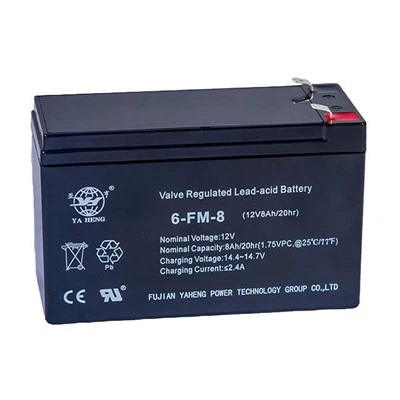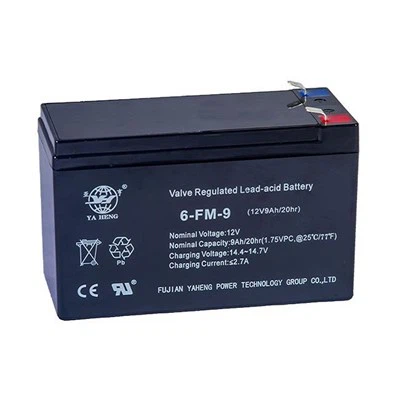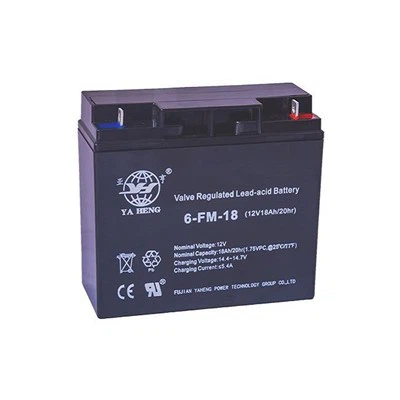UPS Battery
Fujian Yaheng Power Technology Group Co., Ltd established in 1997, covers an area of 224000 m2. Yaheng Power is a professional sealed lead-acid battery and lead-acid battery machinery manufacturer. Yaheng Power Technology Group Co., Ltd is ISO9001, ISO 14001 certified company.We're known as one of the most professional UPS battery manufacturers and suppliers in China.
-
Small UPS Battery12V7AH Battery is one of the most used sealed lead acid battery. The size is L 151*W 65* H 95 mm.Add to Inquiry
-
UPS Power Battery12V8AH Battery is one of the most used sealed lead acid battery. The size is L 151*W 65* H 95 mm.Add to Inquiry
-
Power Supply Battery12V9AH Battery is one of the most used sealed lead acid battery. The size is L 151*W 65* H 95 mm.Add to Inquiry
-
On-line UPS12V12AH Battery is designed with capacity 12AH@ C20, the size is L 151*W 98* H 95 mm, weight 3.50Add to Inquiry
-
Jump Starter Battery12V18AH UPS Battery is designed with capacity 18AH@ C20, the size is L 181*W 77* H 167 mm, weightAdd to Inquiry
- Tel: +86-760-88625562
- Fax: +86-760-88625562
- Email: johny5@126.com
- Add: No.12 Ave.1 North, Industrial Rd. East, Guzhen, Zhongshan, Guangdong, China
Why Choose Us
R&D capabilities
There are 30 employees, some of whom have more than 30 years of experience in the battery industry, and have established a battery material laboratory in cooperation with a famous American university research and development institution. Yaheng has developed different chemical formulas according to the application.
Advanced equipment
With Yaheng automation equipment, Yaheng was the first in China to produce cast-welded batteries, combining mechanical equipment with material technology to shorten the battery development cycle.
Wide product lines
Yaheng batteries meet international standards and have a complete UPS, solar power generation system, telecommunications power system, motorcycle and electric vehicle product line, more than 300 models, 2V, 4V, 6V, 8V, 12V, 16V, 24V and 1.2AH~3000AH.
Accept ODM/OEM service
Our team of experts will work closely with you to understand your needs and will provide solutions that are tailored to meet your expectations.
Advantages of UPS Battery

Lower Operating Costs
UPS batteries are known for their low operating costs. Traditional backup systems rely on generators that consume fuel and require ongoing maintenance. In contrast, UPS batteries can operate for several hours without requiring any additional fuel or maintenance.
Increased Efficiency
UPS batteries also offer increased efficiency compared to traditional backup systems. They are designed to provide power to critical systems quickly, without any delay. This is crucial for firms that depend on consistent power to function properly.


Reliable Power
One of the biggest benefits of UPS batteries is their reliability. They are designed to provide uninterrupted power during power outages or brownouts, ensuring that critical systems remain online. Businesses like data centers, hospitals, and banks that depend on technology may find this to be of special importance.
Environmentally Friendly
UPS batteries are also environmentally friendly. They do not produce any harmful emissions or require fuel consumption, making them a cleaner and greener option compared to traditional backup systems. In addition, UPS batteries can be recycled, which reduces their impact on the environment.

Data Centers
UPS batteries provide backup power to servers, storage systems, and networking equipment in data centers.They help prevent data loss, server downtime, and equipment damage due to sudden power interruptions.
Telecommunications
UPS batteries power telecom infrastructure such as base stations, central offices, and network nodes.Ensures uninterrupted communication services for mobile networks, internet service providers, and other telecom operations during power outages.
Healthcare (Hospitals and Medical Equipment)
UPS batteries are critical in healthcare environments, powering life-saving equipment such as ventilators, monitors, and surgical tools.Ensures that critical medical procedures are not interrupted, preventing life-threatening situations during power outages.
Industrial Manufacturing
In manufacturing environments, UPS batteries provide backup power to critical machinery, control systems, and automation equipment.Helps avoid production line downtime, equipment malfunctions, and loss of materials due to power outages or voltage fluctuations.
Financial Institutions (Banks and ATMs)
UPS systems ensure that banking systems, ATMs, and financial transaction servers remain operational during power disruptions.Financial institutions rely on continuous power to maintain real-time transactions, data integrity, and secure customer access.
Government and Military
UPS systems power critical government and military infrastructure, including communication systems, defense equipment, and security systems.Ensures national security, intelligence, and public safety during power disruptions, which could affect operations or emergency response systems.
Home and Small Office Use
UPS batteries provide backup power to personal computers, home networks, and entertainment systems.Protects against data loss and hardware damage during power surges or outages.
Retail and E-Commerce
UPS systems ensure power continuity for point-of-sale (POS) systems, inventory management systems, and e-commerce platforms.A loss of power could disrupt sales, payment processing, and online orders, leading to financial losses and customer dissatisfaction.
Emergency Services and Public Safety
UPS batteries power essential emergency systems, including 911 call centers, dispatch systems, and emergency response communication networks.Ensures that public safety services, such as police, fire, and ambulance services, can operate without disruption during power failures.
Transportation and Logistics
UPS systems support critical infrastructure in the transportation and logistics industries, including air traffic control, railway signaling, and port operations.Power continuity is vital for maintaining smooth transportation operations, preventing accidents, and ensuring efficient logistics.
Broadcasting and Media
UPS systems ensure continuous power for broadcasting studios, transmission equipment, and media servers.Broadcasting stations must maintain uninterrupted service, especially for news and emergency broadcasts.
Parameter
|
Battery Size |
12V8Ah |
|
Cycle Life |
500 |
|
Storage Type |
Normal temperature 25℃ |
|
Electric Energy |
96Wh |
|
Cells Per Unit |
6 |
|
Nominal Voltage |
12V |
|
Capacity 10hr Rate (6.00A) |
8.1Ah @ to 1.75V/cell |
|
Weight |
Approx (2.27±3%)kg (5.00lbs) |
|
Internal Resistance |
Approx19.0mΩ fully charged @25℃ |
|
Maximum Discharge Current |
90A(3sec) |
|
Terminal |
F1/F2 |
|
Operating Temperature |
Discharge:-20℃~60C; Charge:0℃-50℃ Storage:-20℃~40℃ |
|
Container Material |
ABS(UL94 HB)/UL94-V0 Optional |
Components and Structure of UPS Battery




Plates
Lead alloy plates that store and release electric charge through chemical reactions with the sulfuric acid electrolyte. Rectangular AGM UPS batteries embed the plates in fiberglass mats, while flooded designs submerge them directly in liquid electrolytes. These plates make up the positive and negative terminals of the battery cell.
Terminals
Allow wiring connection to external UPS charging/monitoring circuits and the connected load during discharge. May include multiple positive and negative posts at each end of the battery for higher discharge rates. Proper terminal torque ensures safe, low resistance contacts.
Case
Houses the plates and electrolyte, typically hard plastic. Sealed AGM designs fully isolate electrolyte from exposure during use or installation. Cases include markings for identification and technical specifications like cell voltage.
Vent caps
Some flooded cell wet batteries utilize vented caps that allow gases to escape while preventing spills/leaks. Sealed designs forego top vents for increased safety and flexibility of orientation.
In advanced UPS battery designs, additional monitoring and control circuitry helps maximize performance, protection and life:
Protection circuits
Monitors voltage and prevents over discharge condition through disconnect. This helps prevent permanent damage to cells from excessively deep cycling.
Fuel gauge
Integrated chip calculates approximate runtime minutes based on load and remaining charge. Allows smarter power down of protected equipment as UPS batteries deplete during an extended outage.
Communication lines
Connect advanced battery packs directly to UPS main controller using data connections like I2C. Enables precision charging control and diagnostics to optimize runtime and life.
Temperature sensor
Detects internal cell hotspots beyond safe limits that can accelerate wear and reduce capacity. Signifies need for battery replacement.
UPS Battery Maintenance
Temperature Control
Ensure proper cooling and ventilation in the server room to keep the battery environment at an optimal temperature range (usually around 20-25°C or 68-77°F).
Regular Testing and Maintenance
Perform regular battery testing and maintenance as per the manufacturer’s recommendations. This may include capacity testing, visual inspections, and tightening connections.
Avoid Overloading
Do not overload the UPS beyond its rated capacity. Oversized UPS systems tend to underutilize their batteries, leading to reduced battery life.
Battery Replacement
Follow the manufacturer’s guidelines for battery replacement, typically every 3 to 5 years for VRLA batteries and longer intervals (5-10 years) for Li-ion batteries.
Correct Charging Practices
Ensure that the UPS charging system is well-regulated to prevent overcharging or undercharging, which can degrade battery health.
Temperature Compensation
Some modern UPS for server room offer temperature-compensated charging to optimize battery charging based on ambient temperature.
Packaging and Shipping


Our Certificates






FAQ
We're well-known as one of the leading UPS battery manufacturers and suppliers in China. Please feel free to buy high quality UPS battery for sale here from our factory. For customized service, contact us now.
critical application standby battery, solar battery for powering saws, battery holder for standby battery








